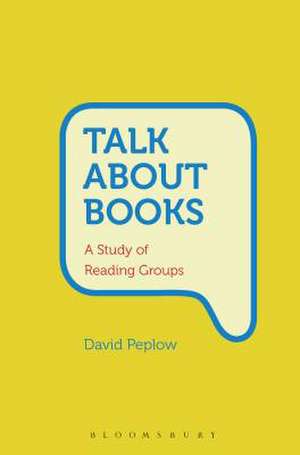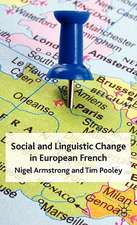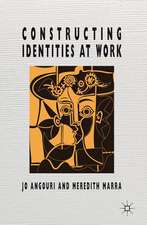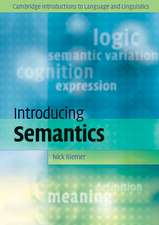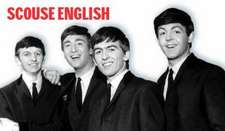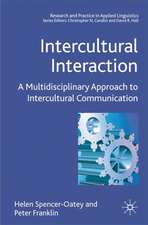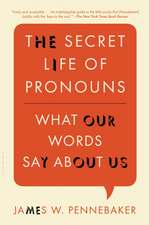Talk About Books: A Study of Reading Groups
Autor David Peplowen Limba Engleză Hardback – 24 feb 2016
| Toate formatele și edițiile | Preț | Express |
|---|---|---|
| Paperback (1) | 256.20 lei 6-8 săpt. | |
| Bloomsbury Publishing – 23 aug 2017 | 256.20 lei 6-8 săpt. | |
| Hardback (1) | 772.65 lei 6-8 săpt. | |
| Bloomsbury Publishing – 24 feb 2016 | 772.65 lei 6-8 săpt. |
Preț: 772.65 lei
Preț vechi: 1112.25 lei
-31% Nou
Puncte Express: 1159
Preț estimativ în valută:
147.85€ • 154.68$ • 122.82£
147.85€ • 154.68$ • 122.82£
Carte tipărită la comandă
Livrare economică 03-17 aprilie
Preluare comenzi: 021 569.72.76
Specificații
ISBN-13: 9781472570222
ISBN-10: 1472570227
Pagini: 208
Dimensiuni: 156 x 234 x 20 mm
Greutate: 0.46 kg
Editura: Bloomsbury Publishing
Colecția Bloomsbury Academic
Locul publicării:London, United Kingdom
ISBN-10: 1472570227
Pagini: 208
Dimensiuni: 156 x 234 x 20 mm
Greutate: 0.46 kg
Editura: Bloomsbury Publishing
Colecția Bloomsbury Academic
Locul publicării:London, United Kingdom
Caracteristici
Considers the act of reading as a social activity, as opposed to something that people do in private - and what this means in terms of our engagement with the written word
Notă biografică
David Peplow is Lecturer in English Language, Sheffield Hallam University, UK
Cuprins
1. Introduction2. The Groups: Communities of Readers3. Reading Group Organisation: Reading Resources4. Reported Discourse in the Groups5. Mimetic Reading in the Groups6. ConclusionBibliographyIndex
Recenzii
Peplow demonstrates detailed analysis of spoken language ... The critical evaluation of CoP [communities of practice] and CA [conversation analysis] in this book is insightful and would be useful for researchers and postgraduate students who are considering using these approaches to analyse their data.
In this detailed and insightful exploration of book group discussions, David Peplow explores the sometimes collaborative, sometimes antagonistic experience of what it means to be a book group member. Working with the fine-grained detail of transcripts of talk, he demonstrates (rather than simply asserts) some of the rhetorical and interactional strategies by which speakers manage their entitlements and obligations as members, how they work up collective readings and judgements, and how reading practices are both revealed and negotiated through interaction. A valuable contribution to the growing scholarship on book groups, Peplow's text offers particular insight into the order and norms of the book group as a community of practice.
Over the last decade, conversation analysis has emerged as the most rigorous and systematic means of studying the things people say about books. Its full power is brought to bear on the speech of four British reading groups in this fascinating study, which should be read by everyone who has an interest in real readers - and is willing to wave farewell to that speculative sacred cow, the 'reader' known to stylistics and literary criticism.
In this detailed and insightful exploration of book group discussions, David Peplow explores the sometimes collaborative, sometimes antagonistic experience of what it means to be a book group member. Working with the fine-grained detail of transcripts of talk, he demonstrates (rather than simply asserts) some of the rhetorical and interactional strategies by which speakers manage their entitlements and obligations as members, how they work up collective readings and judgements, and how reading practices are both revealed and negotiated through interaction. A valuable contribution to the growing scholarship on book groups, Peplow's text offers particular insight into the order and norms of the book group as a community of practice.
Over the last decade, conversation analysis has emerged as the most rigorous and systematic means of studying the things people say about books. Its full power is brought to bear on the speech of four British reading groups in this fascinating study, which should be read by everyone who has an interest in real readers - and is willing to wave farewell to that speculative sacred cow, the 'reader' known to stylistics and literary criticism.
